Tenencia de la Tierra y Barrios Urbanos
Palabras clave:
Barrios Urbanos Auto producidos, Regularización Jurídica, Derecho Escrito, Derecho Alternativo. Self constructed urban neighborhoods, Juridical regularización, Written law, Alternative law.Resumen
RESUMEN
Referirse a los barrios auto producidos en el Área Metropolitana de Caracas, en la coyuntura actual lleva, necesariamente, a acometer la cuestión de la regularización jurídica de estos.
¿El Decreto Presidencial Vigencia Nº 1.666, del 4 de febrero 2002, contribuirá a resolver las dificultades encontradas en el proceso de formación y consolidación de los barrios urbanos y su regularización jurídica?
El tema merece un abordaje teniendo en cuenta que, el derecho escrito que no considere el que se ha ido conformando a partir de las prácticas sociales (llamados por algunos derechos alternativos), no contribuirá al éxito del proceso de regularización. Asimismo, es muy importante reconocer y estimar los aportes técnicos y profesionales y sumarlos a los que han proporcionado los “Hacedores de Ciudad”. Ambos saberes deben aceptarse para poder llegar a encontrar vías que conduzcan a la solución de una cuestión esencial a la ciudad, a la sociedad y por supuesto a los que viven en los barrios urbanos.
En todas estas consideraciones está muy presente la cuestión de la nueva gobernanza.
ABSTRACT
Referring to the self constructed neighborhoods in the Metropolitan Area of Caracas, in the current circumstances takes us, necessarily, to the question of their juridical reguralization.
¿Will the Presidential Ordinance Nº 1.666, in effect since February 4, 2002, contribute to solve the difficulties found in the formation and consolidation process of urban neighborhoods and their legal regularization?
The topic deserves to be approached keeping in mind that, the written law that doesn’t consider the one that has been conformed from the social practices (called by some alternative law), won’t contribute to the success of the regularization process. Also, it is very important to recognize and estimate the technical and profesional contributions and complement them with those provided by “City Makers”. Both experiences should be accepted to be able to find roads that take us to the solution of a question that is essential to the city, to the society and of course to those that live in urban neighborhoods.
All these considerations imply the question of the question of the new governance.
